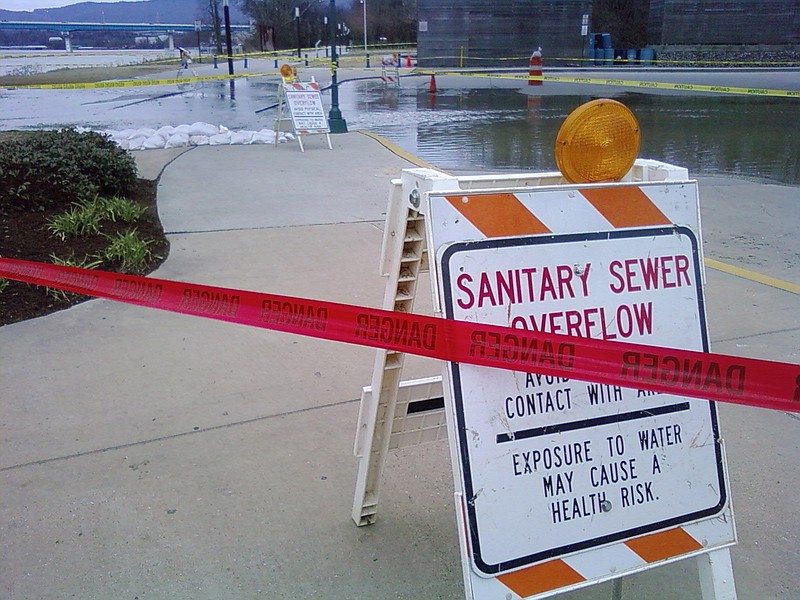Growth is hard. We've said it before - but it bears repeating.
Growth is especially hard in our Chattanooga-area geography where the natural beauty of our mountains and ridges are cut by meandering streams and a gorgeous but flood-prone river valley. Yet, grow we do - with new jobs bringing more people and more homes and more need for both clean water and safe, affordable ways to carry off and clean our waste.
Sewers are not a sexy topic. But just try growing in the 21st century without them - especially with as much or more rain each year than in Seattle, flying down nearby slopes at a velocity that frequently overpowers much of our early- and middle-20th century wastewater systems.
Ask yourself where there is a hole in the ground big enough to hold all the waste for today's half a million people living here - let alone tomorrow's. Ask yourself if you think our river is wide enough and fast enough to carry that waste completely away from the next drinking water intake.
There simply is no easy out-of-sight "away" when it comes to cleaning up after ourselves. The fix will only become fully available when we employ some good-old-fashioned thinking, some good-new-fashioned and high-tech engineering and a willingness to take our lumps with the necessary regulation and expense.
We should understand this by now, given all our fits and starts with stormwater runoff, sewage treatment failures, sprawl, traffic jams on our interstate parking lots and continuing angry zoning meetings over still-unresolved land use and steep-slope building codes.
In 2013, Chattanooga was forced by the U.S. Environmental Protection Agency to budget more than $264 million for 86 separate projects to stop sewage overflows into the Tennessee River by July 2020. Now Hamilton County Water and Wastewater Treatment Authority board chairman Mike Moon expects WWTA will soon be making a similar commitment when it signs its own mea culpa consent decree with EPA sometime early in 2019. WWTA's mandate is expected to tally around $245 million in fixes and upgrades.
Like clockwork, our governments amp up plans to pass those costs right along to us in the form of ever-rising sewer fees.
They blame EPA, but EPA is neither the bad guy nor the one in our bathrooms and kitchens.
The real problem is us - and our local governments. For years on end, we and our governments have not had the political will to build better infrastructure all along. We and therefore our governments have not had the political will for years on end to tell developers that they had to follow common-sense rules.
Instead, we did just what that stormwater and wastewater does - we took the path of least resistance:
* Instead, both Chattanooga and Hamilton County waited until EPA forced them to move, then whined that EPA is holding a gun to our heads.
* Instead, a year ago, developers persuaded the Chattanooga City Council to ease a standard for stormwater runoff retention put in place four years before along the extremely flood-prone South Chickamauga Creek that drains some 400 square miles of land and empties into the Tennessee River. (Builders and business owners who had faced higher mitigation fees argued that infrastructure to hold 1.6 inches of runoff on site rather than the 1 inch required by the state drove up development costs and put the entire responsibility for a regional problem on a small group of builders. Well, yeah. Some sites are just inherently more expensive to build on - for a reason.)
* Instead, just last month, controversy rocked when a spokesman for builders told council members that a proposed temporary slope zoning rule that would limit grading or clearing on slopes of 33 degrees or greater "could possibly result in a de facto moratorium on development in the Chattanooga area." Again: there's a reason.
* Instead, we shook our heads while city stormwater violations more than doubled over the past six years, according to the city's land development office. In the meantime, more than 83 percent of the 597 rezoning cases reviewed by the Chattanooga-Hamilton County Regional Planning Agency were for steep slopes, flood plains or both.
* Instead, we wrung our hands as the Tennessee Department of Environment and Conservation warned WWTA in early November that new sewer tap-ons in the fast-growing area of Ooltewah could be halted after 29 overflows in the past year spilled 2 million gallons of sewage into Rogers Creek.
* Instead, the community of Ooltewah congratulated itself a few weeks ago for dissuading the Hamilton County Commission from approving a proposed new WWTA sewage treatment plant there - albeit true that the plan is likely not the best our county can do. (More on this Sunday.)
* Instead, we huffed angrily when the nonprofit environmental group Tennessee Riverkeeper sued WWTA in federal court for sending some 20 million gallons of sewage from the Signal Mountain wastewater treatment plant to the Tennessee River since 2013. Darn those environmentalists.
* Instead, we refuse to see what's as plain as the noses on our faces.
Is it any wonder why growth is so hard here?
